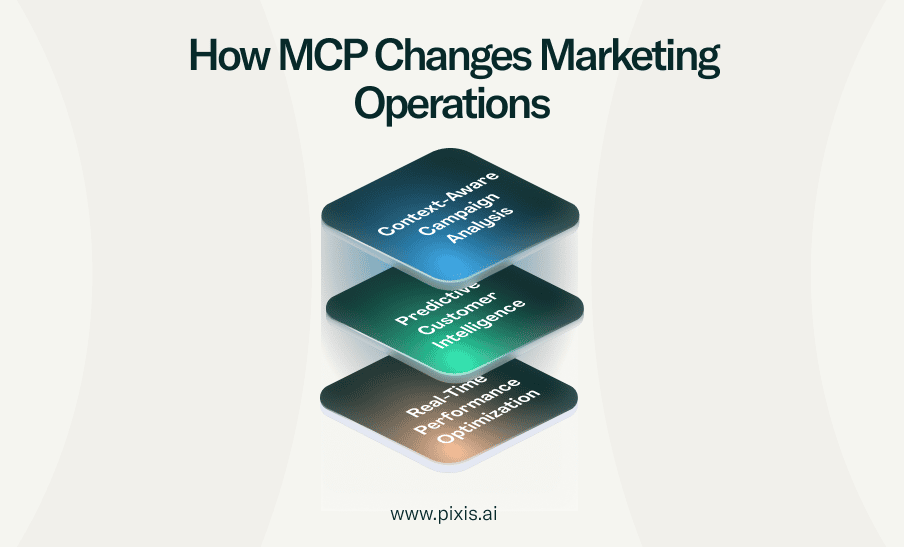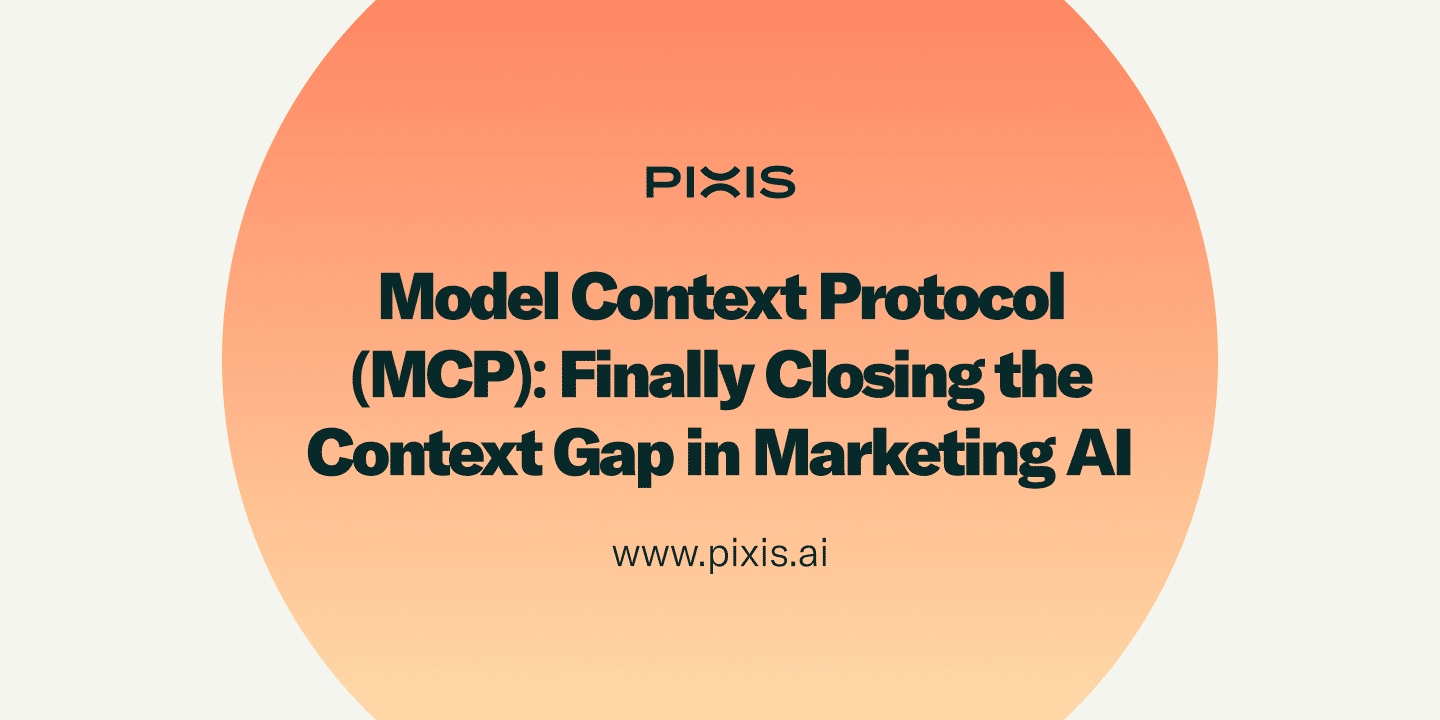Let's paint a picture of your average Tuesday morning.
- You start in Google Analytics (tab 1)
- jump to Salesforce (tab 2)
- check your email campaign performance in Mailchimp (tab 3)
- review yesterday's ad spend in Facebook Ads Manager (tab 4)
- and then – because you apparently you enjoy giving yourself whiplash– you open ChatGPT to ask for "marketing insights" based on... absolutely none of that data you just looked at (tab 5)
Now imagine if your AI assistant actually knew what was going on in those five tabs. What if it could pull in your ad spend, email engagement, CRM activity, and web analytics all at once, and give you insights that reflected your real business performance?
That’s exactly what the Model Context Protocol (MCP) does.
Yes, the name sounds like it belongs in an engineering manual. And it does. But it’s a big deal.
(Speaking of engineering, you might have heard the term "context engineering" as one that's starting to replace "prompt engineering" as the hot new thing in AI. Our Solution Engineer, Ben Crespin, wrote an excellent breakdown of what performance marketers should actually know about context engineering without all the technical AI talk.)
Released by Anthropic in November 2024, MCP creates direct, standardized pathways between your business systems and AI tools. It bridges the context gap between data silos specifically for LLMs to make better use of that data for... whatever you want.
Now, they don’t have to guess. They just know.
What MCP Actually Does
The Model Context Protocol (MCP) standardizes how AI applications connect to external data sources.
Sure, some platforms already offer native integrations. SEMrush, for example, has a built-in connection to LinkedIn for company page analytics. But even pre-built integrations often come with friction: custom fields, API key setups, authentication headaches, and compatibility issues across versions. Using them still burns time on configuration and upkeep.
MCP offers a smarter alternative.
It creates a universal interface—a shared language any compatible AI assistant can use to interact with your business systems. Whether it’s your CRM, ad platform, email service, or analytics stack, MCP gives your tools a way to speak to your AI without the usual middleware mess.
Technically, it works through MCP servers that sit between your data sources and AI clients. You connect each system once, and any AI that supports MCP can start reading (and, depending on permissions, acting on) that data instantly.
Why Enterprise Marketing Teams Are Paying Attention
The martech landscape has crossed a complexity tipping point. The 2025 landscape lists 15,384 marketing tools, up 9% year-over-year. Despite vendor consolidation, the average B2C team still added two more point-solutions last year, creating additional silos and integration drag.
This tool sprawl now costs more than media waste. Analysts estimate every redundant platform absorbs 5-10% of a marketing budget in license fees, IT support, and rework. Meanwhile, Scott Brinker's updated stack model separates Systems of Truth (your data warehouse, CDP, CRM) from Systems of Context (the AI layer that decides what to do next). Most marketing teams nailed the first half years ago; the second half remains missing.
MCP bridges this gap by eliminating entire classes of "bridge" applications, piping decisions straight from data to channel APIs without the typical integration overhead.
How MCP Changes Marketing Operations

The stats don't lie: marketers spend 40% of their time on data wrangling instead of actual marketing. Here’s how and where MCP helps:
1. Context-Aware Campaign Analysis
When your AI can access cross-platform performance data, campaign optimization becomes strategic rather than reactive. Instead of adjusting ad spend based on single-platform metrics, you can analyze customer acquisition costs across all channels, identify the highest-value audience segments, and redistribute budget based on true ROI attribution.
Forrester's 2024 Marketing Technology Report found that companies with integrated marketing data see 27% higher campaign ROI compared to those operating in silos.
2.Predictive Customer Intelligence
MCP enables AI to analyze complete customer lifecycles, not just individual touchpoints. Your AI can identify early indicators of churn, predict which prospects are most likely to convert, and recommend personalization strategies based on behavioral patterns across your entire tech stack.
3.Real-Time Performance Optimization
Rather than waiting for monthly reports to identify underperforming campaigns, MCP-enabled AI can monitor performance across all channels simultaneously and recommend optimizations as they're needed. This reduces the lag time between campaign launch and optimization from weeks to hours.
Why MCPs Are Mission-Critical Right Now
The convergence of several trends makes MCP adoption urgent:
- GenAI has multiplied testing velocity – Creative AI can generate dozens of campaign variants in minutes, but without a protocol that automatically scores, budgets, and launches the best performers, you're drowning in options instead of scaling insights.
- Channel volatility demands plug-and-play architecture – New ad networks and API changes now drop quarterly. Because MCP lives between your "truth" systems and activation channels, you swap in a connector rather than rebuild entire pipelines whenever the media landscape shifts.
- Budget scrutiny has intensified – Every redundant tool, delayed decision, and manual process now faces CFO-level examination. MCP eliminates the integration tax that's been hidden in your operational overhead.
The CDP Institute's latest research shows that marketing teams using real-time decision engines report significantly faster response times to market changes and campaign performance issues. This speed advantage compounds over time, creating sustainable competitive differentiation.
Real-World Applications of MCP in Marketing (That Are Already Happening)
🛒 Shopify: Turn Your Store Into a Smart Assistant
If you're using Shopify, imagine this: instead of copy-pasting data into prompts, your AI assistant already knows what’s in stock, what’s trending, and what a customer just added to their cart.
That’s what Shopify’s Storefront MCP server makes possible. With it, AI agents can:
- Search your product catalog in real time
- Answer customer questions like “Do you have this in a different color?”
- Manage carts and make purchase suggestions based on live store data
You’re no longer guessing what content might work or what product to promote. Your AI can respond with accuracy, grounded in real-time insights—without requiring a single manual integration from you.
🌐 Wix: Let Your Website Optimize Itself
Now think about your website. How long does it take to update a banner, change a headline, or test a new CTA?
With Wix’s MCP server, AI agents can now access and edit your site’s live content. That means:
- Running copy experiments without dev time
- Personalizing sections of your homepage based on visitor behavior
- Rolling out high-performing layouts on the fly
Instead of being locked into static pages and post-campaign cleanups, you’re working with a dynamic, AI-augmented website that evolves with your audience in real time.
Of course, Shopify and Wix aren’t the only ones experimenting with this. Shiprocket is using MCP to power smarter logistics-based operations, while Atlassian is connecting internal tools like Jira and Confluence to AI agents that help teams automate workflows.
Overcoming Common Implementation Challenges
Data Security Concerns
In April 2025, security researchers released analysis that there are multiple outstanding security issues with MCP, including prompt injection, tool permissions where combining tools can exfiltrate files, and lookalike tools can silently replace trusted ones.
These security considerations shouldn't stop you from exploring MCP, but they should inform your implementation approach. Work with your IT security team to establish proper access controls, data governance policies, and monitoring systems.
Team Training and Adoption
Your marketing team will need to adapt to new AI-powered workflows. Start with power users who are comfortable with technology, then expand training as you demonstrate value and build confidence.
Vendor Compatibility
Not all marketing tools support MCP yet, but the ecosystem is growing rapidly. Prioritize vendors that are committed to open standards and have MCP on their roadmap.
The Future of Marketing Is Connected
Remember those five tabs you opened this morning?
Analytics. CRM. Ads. Email. ChatGPT.
MCP is just pipes. Nothing too fancy. But what it enables is super exciting.
No toggling. No copy-pasting. No asking your AI assistant for insights it can’t see. Instead, your assistant already knows. It’s reading performance across every platform, recognizing patterns in your CRM, tracking spend across channels, and delivering suggestions that actually make sense.
That’s what MCP enables:
A future where your tools work together.
Where AI actually understands and remembers the context in which you're prompting it.
Where strategy moves at the speed of change.
Early adopters are already operating in this future. Their workflows are tighter, their insights sharper, and their decisions faster. And as MCP adoption grows, the gap between teams who are guessing and teams who are guided will only widen.

